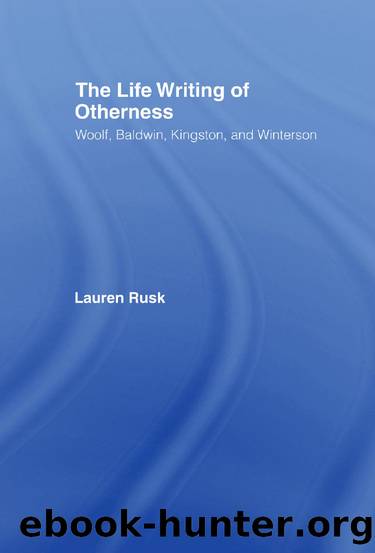The Life Writing of Otherness by Rusk Lauren;

Author:Rusk, Lauren;
Language: eng
Format: epub
Publisher: Taylor & Francis Group
Published: 2002-08-15T00:00:00+00:00
A third stage of the voice motif brings together the images of inarticulate girl, wife-prospect, and opera singer in a partial resolution, in the scene of the teenage protagonistâs self-disclosure to her parents. It does not come easily; the girl tries for weeks to express herself, whispering confessions while her mother starches the shirts, until sheâs told to shut up. She feels âsomething alive tearing at my throat, bite by bite, from the inside.â At last, the continual presence of a suitor spurs her to the breaking point. He is a retarded, ape-like older man, who carries cartons to sit on filled with pornographic pictures. Yet her parents silently permit the manâs vigil because he owns a chain of profitable toy stores. Finally, at dinner in the laundry, the girlâs âthroat burst open.â Jumping up to confront her parents, she refuses to be fixed up, proclaims that sheâs going to college, and blurts out her whole litany of guilty secrets. The girlâs freed tongue also becomes an instrument of collective insurrection. âAnd you leave my sister alone,â she yells. âYou try that with the [matrimonial] advertising again, and I'll take her with me.â The protagonistâs âtalking and burblingâ resounds in her ears with a âvoice like Chinese opera. I could hear the drums and the cymbals and the gongs and brass hornsâ (233, 236).
Striking out, she takes on the glory of an opera warrior, refusing the role of self-lacerating heroine. In contrast to the singer in the previous scene, the protagonist cries out not to invite injury but âto stop the pain in my throat,â not to submit but to rebel, not to conform as a daughter-in-law but to reveal her individuality: âI had to tell my mother so that she would know the true things about me â¦â (229). 90
Aspects of this scene of self-revelation seem to comment on the construction of autobiography, by the writer and the audience. The protagonistâs torrent of âtrue thingsâ is a mixture of concrete and imaginary events from different times âscrambled out of order,â all equally present in the telling. Brave Orchid, the auditor, is analogous to the reader. The confession stirs her to participate in the process of its creation: âShe herself was shouting out things I had meant to tell her â¦â (236).
The climactic incident enables me to gather together previous images having to do with self-disclosure and performance. Moreover, merging the images of the choked-up girl and the opera singer, the tirade recalls yet another earlier passage. This new link allows me to see, in retrospect, that in grade school, the protagonist is psychologically preparing for self-discovery when
My silence was thickestâtotalâduring the three years that I covered my school paintings with black paint. I painted layers of black over houses and flowers and sunsâ¦. I was making a stage curtain, and it was the moment before the curtain parted or roseâ¦. I⦠pretended the curtains were swinging open, flying up, one after another, sunlight underneath, mighty operas. (192)
Download
This site does not store any files on its server. We only index and link to content provided by other sites. Please contact the content providers to delete copyright contents if any and email us, we'll remove relevant links or contents immediately.
4 3 2 1: A Novel by Paul Auster(11788)
The handmaid's tale by Margaret Atwood(7447)
Giovanni's Room by James Baldwin(6808)
Asking the Right Questions: A Guide to Critical Thinking by M. Neil Browne & Stuart M. Keeley(5355)
Big Magic: Creative Living Beyond Fear by Elizabeth Gilbert(5351)
Ego Is the Enemy by Ryan Holiday(4956)
On Writing A Memoir of the Craft by Stephen King(4662)
The Body: A Guide for Occupants by Bill Bryson(4582)
Ken Follett - World without end by Ken Follett(4443)
Bluets by Maggie Nelson(4261)
Adulting by Kelly Williams Brown(4232)
Eat That Frog! by Brian Tracy(4149)
Guilty Pleasures by Laurell K Hamilton(4116)
White Noise - A Novel by Don DeLillo(3829)
The Poetry of Pablo Neruda by Pablo Neruda(3814)
Fingerprints of the Gods by Graham Hancock(3738)
Alive: The Story of the Andes Survivors by Piers Paul Read(3730)
The Book of Joy by Dalai Lama(3697)
The Bookshop by Penelope Fitzgerald(3619)
